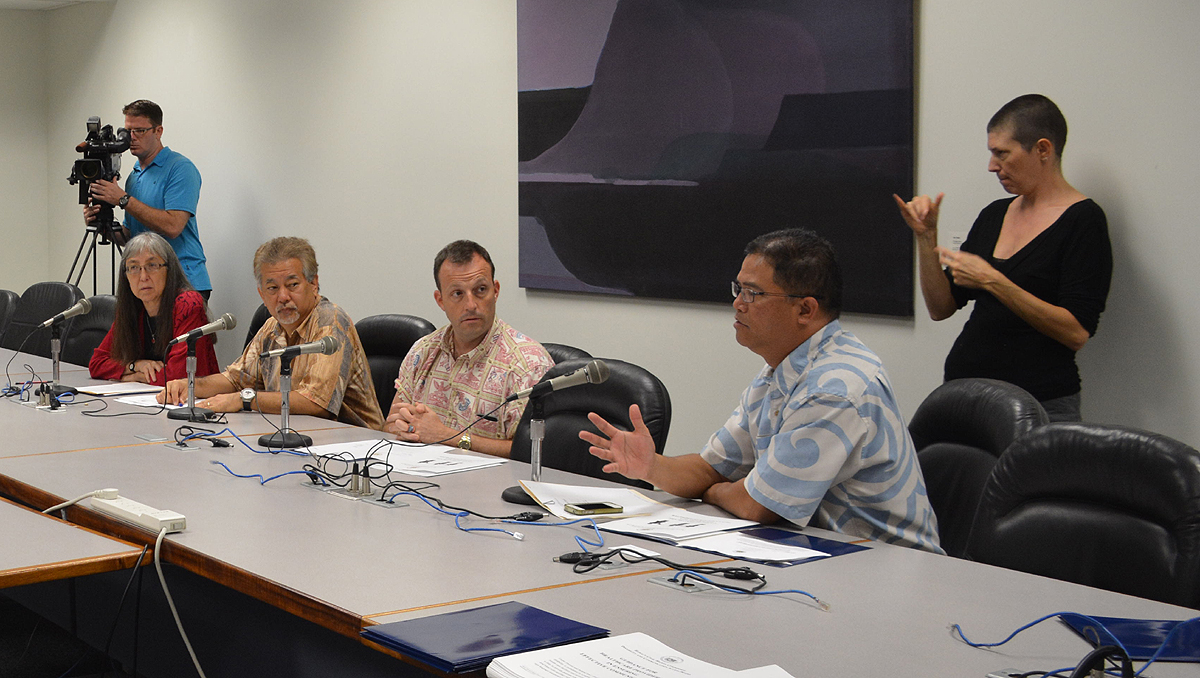Honolulu, Hawaii – State agencies held a press conference on Wednesday, reminding health care providers of the legal obligations for Hawaii’s deaf and hard of hearing.
Department of Labor and Industrial Relations sent this news release:
The Hawai‘i Civil Rights Commission (HCRC) and the Disability and Communication Access Board (DCAB) today announced a joint public education effort to inform patients who are deaf, hard of hearing and deaf blind and use sign language as well as health care providers of their legal rights and responsibilities. Under state and federal law, health care providers have an obligation to provide auxiliary aids and services for patients who have disabilities, including qualified sign language interpreters when needed to provide effective communication.
One to two percent of people in Hawaiʻi are deaf, hard of hearing or deaf blind. A majority of them use American Sign Language (ASL) to communicate. Using ASL interpreters, they have full access to information and services, including the health care services. Under the Americans with Disabilities Act and Hawaiʻi state civil rights law, they have the right to effective communication in medical and health care services.
“We receive a high volume of requests for information and assistance regarding the provision of sign language interpreters and the highest number relate to health care settings,” said DCAB Executive Director Francine Wai. “All health care providers in Hawai‘i, from hospitals to community clinics and small practitioner doctor offices, are legally obligated to provide auxiliary aids and services, including sign language interpreters, at no cost for patients who are deaf, hard of hearing and deaf blind.”
HCRC Executive Director Bill Hoshijo added: “Deaf patients have come forward to report that doctors’ offices have denied requests for sign language interpreters, citing cost or asking the patient to secure coverage and payment for those services, which does not comply with state or federal law. Unfortunately, many health care providers and patients are not aware of their obligations and rights in this area.
“Deaf, hard of hearing and deaf blind patients are being denied sign language interpreters needed to effectively communicate. As a direct consequence, they cannot communicate their health problems to the health care provider, cannot obtain critical information like diagnoses and prognoses, and cannot give informed consent. Too often, this results in a denial of services based on disability.”
The agencies have developed educational materials for health care providers and patients to help address the need for public education as well as the consequences of unlawful denial of requests for sign language interpreters.
For more information, visit: http://health.hawaii.gov/dcab/communication-access/ Dept. of Labor and Industrial Relations
Also, the views of Hawaii State Representative James Tokioka were represented in this House media release:
State Representative James Tokioka (Wailua Homestead, Hanamaulu, Lihue, Puhi, Old Koloa Town, Oma`o) applauded the actions taken by the Hawaii Civil Rights Commission and Disability and Communication Access Board that unveiled today public education materials on the legal obligations and rights of health care providers and patients. Under state and federal law, health care providers have an obligation to provide auxiliary aids and services for patients who have disabilities, including qualified sign language interpreters when needed to provide effective communication.
For Tokioka (who has a son, Pono, who is deaf), the hurdles and challenges of those who are deaf or who are hearing impaired and their families are ones he has personally experienced in his own life.
“I am personally grateful to the Executive Director William Hoshijo of the Hawai‘i Civil Rights Commission (HCRC), Executive Director Fancine Wai of the Disability & Communication Access Board (DCAB), Senator Josh Green, Kristine Pagano of DCAB and Delphine le Marie for taking this proactive approach to assisting our families who struggle to negotiate everyday activities that most of us give little thought to, like a visit to the doctor,” Tokioka said.
“I can’t tell you how important this initiative is for these families and what a difference it makes in their lives, when qualified sign language interpreters are available to help them communicate with their doctors during a normal visit or with a hospital attendant in an emergency situation, which can include serious life and death situations.”
“The deaf do not choose to be deaf, but must sometimes rely on others for help. Government is set up to help those who cannot help themselves, and this is a clear case when government should and must step in to help. If we can create greater awareness and better educate not only our health care providers but our entire community, we’ll help to create a better quality of life for these individuals and their families.”
One to two percent of people in Hawaii (approximately 16,000) are deaf, hard of hearing or deaf blind. Under the Americans with Disabilities Act and Hawaii state civil rights law, they have the right to effective communication in medical and health care services.Hawaii State House


by Big Island Video News10:13 pm
on at
STORY SUMMARY
Education effort to inform patients, health care providers of their legal rights and responsibilities